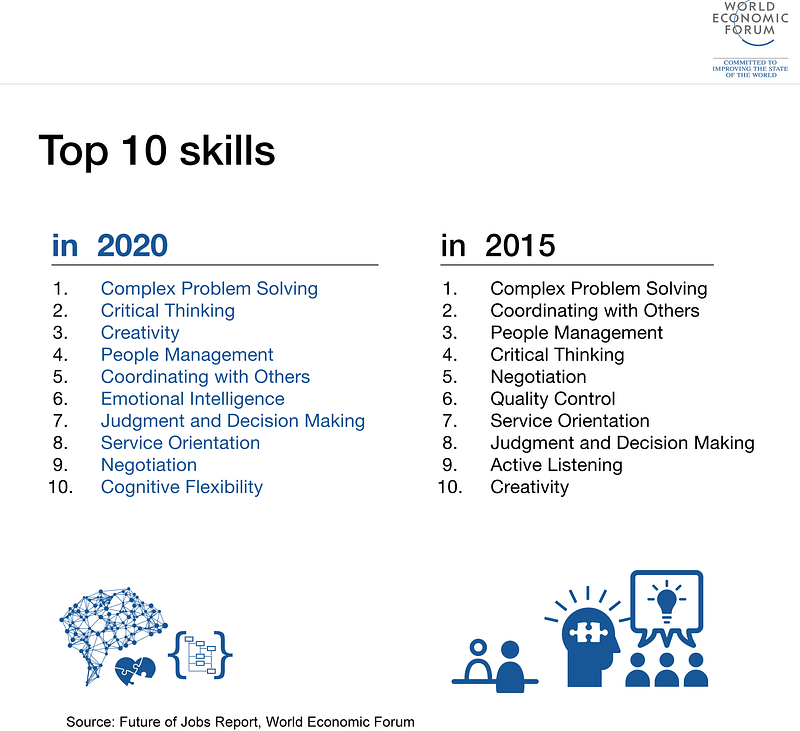The Most Important Trait Leaders Need for the 21st Century

It’s not enough to be an expert these days.
Our new normal is for tech startups to dominate century-old industries, for exponentially advancing technology and interconnectivity to make things really complex, and for more and more jobs to be done by robots. Fortunately, we’re seeing more deserved attention to the fact that organizations must be adaptive, responsive, and agile to thrive in our future of work.
But on an individual level, our fast-changing world is a reality check to those who have spent years honing in on expertise in one specific domain. While it still is a major plus, being an expert at one thing is less valuable than it was before. Past behavior doesn’t always predict future success, which challenges the old business catchphrase. So what’s needed beyond expertise for individuals to flourish? What else do we need to thrive in our future of work?
Luckily, researchers at Columbia University and the Center for Creative Leadership may have an answer. From studying current leaders among many levels of many organizations, they found that most successful leaders tended to have one specific trait: learning agility.
“Learning agility is the mindset and practice that allows leaders to continually develop, grow, and utilize new strategies that will equip them for the increasingly complex problems they face in organizations.”
Simply put, learning agility is how quickly you can learn new skills that will help you solve complex problems.
According to the World Economic Forum Future of Jobs report, not only will complex problem solving remain the number one skill in the next decade, but the top skills of today will fluctuate in five years:

Imagine what the Top 10 Skills in 2030 would look like.
The exact trait we need to crush it at complex problem solving and to quickly get good at valuable skills of the future? I’d argue it’s learning agility.
To be clear, learning agility doesn’t mean you’re a jack-of-all-trades: someone who’s good at a lot of things (though it certainly can result in you being one).
Rather, you’re a master of becoming a master at anything.
The Learning Agility Framework
To have learning agility, you are:
Innovative: You aren’t afraid to challenge the status quo.
Performing: You stay calm in the face of difficulty.
Reflective: You take time to reflect on your experiences.
Risking: You intentionally put yourself in challenging situations.
Open-minded: You resist the temptation to be defensive and listen.

Courtesy to
Everyone in Your Org With Learning Agility → More Org Agility
Imagine if everyone in your company is completely obsessed with learning a lot about a lot. It’d be the Monday norm for your colleagues to splurge their thoughts to you about a book they finished over the weekend. And you can’t wait to geek out to them about an online course you just started taking. If everyone in your org has the ability to learn quickly, if everyone has learning agility, how much would this increase your org’s agility?
Probably by a lot.
To promote learning agility in your org, the possibilities are endless, but here are a few places to start:
Allow your team members to feel safe to try things and speak their mind. It’s no wonder people a part of the most effective teams feel safe and take risks without feeling insecure or embarrassed. Provide a space for them to voice their own opinions and try their own ideas.
Don’t hesitate to give free learning materials and resources. Googlers receive a set of free online classes when they’re hired.Basecamp gives their employees an allotment of $1000 a year for continuing education. This can even be as simple as having everyone bring their favorite book to work and exchanging it with another colleagues’.
Make sure everyone has the authority to conduct a retrospective. Giving everyone the opportunity to conduct a retrospective will get people to practice reflecting, which can nicely manifest into a personal habit. And retrospective facilitating shouldn’t be limited to upper management or certain roles: Spotify for example has volunteers conduct their large-scale retrospectives.
“Ultimately, our ability to continuously learn and adapt will determine the extent to which we thrive in today’s turbulent times.”
The Creative Center for Leadership summed it best. The future of work has huge obstacles in store, but what separates those who’ll thrive versus those who won’t is the eagerness to take these obstacles head-on knowing there is much, much more to learn. Will that be you?
I wrote this piece for The Ready’s Publication. Want more?Sign up to get their newsletter This Week @ The Ready delivered to your inbox every Saturday. Receive links to articles and perspectives on org design, technology, and the future of work.
Follow Me on Twitter |Follow The Ready on Twitter | TheReady.com
